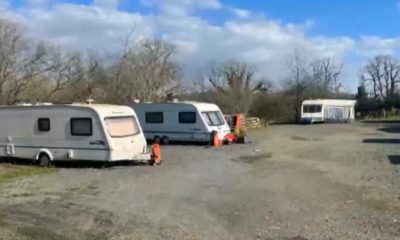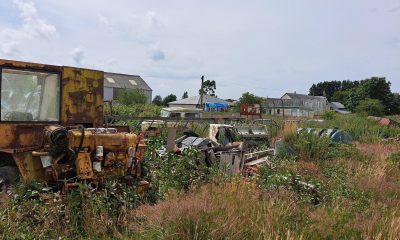Farming
Interim agricultural support scheme branded a ‘shambles’

Chris Haines, ICNN Senedd reporter
THE LAUNCH of an interim agricultural support scheme has been described as a shambles which could see some farmers’ payments fall by as much as 90%.
Conservative, Plaid Cymru and Lib Dem politicians all added their voices to a chorus of criticism surrounding the Welsh Government’s Habitat Wales scheme.
Habitat Wales is replacing the Glastir sustainable land management scheme, which closes at the end of the year, until a new Sustainable Farming Scheme is launched in 2025.
Questioning the minister responsible, Samuel Kurtz told MSs that the Welsh Government carried out no economic modelling to inform development of Habitat Wales.
“It has been a shambles,” said the Tory MS for Carmarthen West and South Pembrokeshire.
Mr Kurtz added that suggestions stakeholders had been involved in developing the scheme have been fiercely contested.
Lesley Griffiths replied: “I disagree with you completely that it’s a shambles.
“This was something that, actually, the farming unions, particularly NFU Cymru, wanted me to bring forward.”
The rural affairs minister told the Senedd that if people wanted a seven-year predictable budget, then they should have voted to stay in the European Union
“That’s what we had when we were in the EU and we had that funding year on year,” she said. “And I could roll it over, and I could extend it. That’s gone – that flexibility has gone.”
She explained that no economic analysis was carried out because the scheme was brought forward quickly at the behest of the sector, adding that 1,600 farmers have signed up.
Mr Kurtz said Welsh ministers have the power to continue Glastir: “We’ve seen that in Scotland; we’ve seen that in England….
“You mentioned that 1,600 farmers have signed up. Three thousand Glastir contracts in Wales; 17,000 registered farms in Wales – 1,600 applicants is a damning indictment.”
Ms Griffiths stressed that the Welsh Government has protected the Basic Payment Scheme, the largest rural support programme, which has been cut by 55% in England.
The Farmers’ Union of Wales (FUW) has estimated that 70% of Habitat Wales scheme forms that it has analysed include serious errors in terms of habitat mapping.
Llyr Gruffydd, for Plaid Cymru, said: “Minister, you’ve disputed the earlier description of the Habitat Wales scheme as a shambles, so, let’s be kind: you have to admit it’s been rather discombobulated in terms of the way that some of the mapping issues have played out.”
The shadow minister pointed out that three quarters of those in Glastir are not applying to the interim scheme, asking: “What does that tell you about the Habitat Wales scheme?”
Recognising that the Welsh Government needs to learn lessons from Habitat Wales, Ms Griffiths said: “I absolutely take on board what you say about criticism about mapping.”
Russell George, the Tory MS for Montgomeryshire, said he met the FUW last week and farmers are facing cuts of 65% to 90% if they apply to the new scheme.
He said: “Issues were raised around mapping errors, reduced payment rates, and, as they put it, a cliff edge for organic producers, making it difficult to make use of this scheme.”
Jane Dodds, the leader of the Lib Dems in Wales, told the chamber: “I met one female farmer and her daughter and she was in tears.
“She and her daughter are really not sure how they’re going to keep the staff and the community that they live in, given that they are losing such a high degree of funding.”
Conservative MS Peter Fox raised concerns about support for an organic farmer in his constituency who will receive £700 compared with £16,000 from Glastir.
During rural affairs questions on Wednesday October 8, Ms Griffiths said she is hoping to bring forward a separate pot of money for organic farming.
She said: “I wish I could have carried on with Glastir with the amount of funding. And if the UK Government had given us the funding they promised they would, I could have.”
Farming
E-Tickets now on sale for Pembrokeshire County Show 2024

E-TICKETS are now on sale for this summer’s Pembrokeshire County Show, the largest county agricultural show in Wales. Preparations are coming together well for what is set to be a fantastic two days of livestock, competitions, attractions and much more.
General entry tickets for the show, taking place on Wednesday and Thursday, 14 & 15 August, are now available at an ‘early birds’ rate online from the website. Ticket prices have had to increase slightly to cover costs but still remain below 2019 charges. The early bird rate for Adults is £15, children £8 (5-16 years), Carers as well as children four years and under are free. Please visit: www.pembsshow.org to purchase your e-tickets.
Adam Thorne, President of Pembrokeshire Agricultural Society said, “At the event in August visitors will be able to tickle their tastebuds in the Castell Howell Food Hall, marvel at the livestock classes, enjoy watching the dog agility, be wowed by the showjumping, explore the horticulture, arts and crafts entries.
Shop ‘til they drop in the Country Market area, which will showcase over 40 quality local and award winning product and craft stalls and much more.”
Pembrokeshire Agricultural Society Membership packages are also available and these include admission to the Show and the Members’ Area. Purchasing membership of the society will support its aim to promote, advance and improve agriculture, horticulture and rural crafts and skills by the improvement of livestock and the demonstration and showing of livestock, machinery, crafts, products, methods and processes connected with agriculture and agricultural education in particular by the holding of an annual show. Full details are available on the website: Become A Member | Pembrokeshire County Show | Pembs Agricultural Society (pembsshow.org)
Putting together this event is hard work and requires an enormous effort by the staff, volunteers and trustees of Pembrokeshire Agricultural Society. The Society is indebted to so many for their commitment and support in helping host the event.
A special mention must go to the county show sponsors. Pembrokeshire Agricultural Society is proud to have many local, regular, sponsors who make the event possible.
Sponsorship Director, Richard Cole, said, “Sponsorship and Pembrokeshire County Show have been a successful combination for the last 45 years. Sponsors have enjoyed promoting their businesses through the varied mediums of banners, announcements, show rings, buildings, equine and livestock classes and championships over the years. It isn’t too late. If you’d like to discuss becoming a corporate sponsor please complete the form on our website: www.pembsshow.org.”
Farming
Pembrokeshire Agricultural Society in search for county’s top progressive farmers

IF you farm in Pembrokeshire and can demonstrate your farm’s use of the latest technological methods to promote progressive, sustainable agriculture then the Pembrokeshire Agricultural Society encourage you to enter the prestigious Baron de Rutzen Award.
Adam Thorne, Pembrokeshire County Show President, said, “We are looking for local Pembrokeshire farmers, under the age of 45, who can demonstrate their farm’s use of the latest technological methods to promote progressive, sustainable agriculture. They also need to show consideration for the environment and habitat sensitivity on their farm as well as present an aesthetically pleasing example of farming in the county. The competition welcomes all livestock and arable sectors to take part.”
Last year’s winners of the Award were Mark and Caroline Davies of Little Newcastle, Haverfordwest. They milk 230 pedigree Holsteins through a fully automated system. They rear their own replacements and also have a small beef enterprise. The farm is all grassland and they follow a strict reseeding and liming policy to optimise the yield from their multi-cut silage system. The couple place significant emphasis on animal health, husbandry and breeding to maximise the efficiency of their system.
Baron John Fredrick De Rutzen was President of Pembrokeshire Agricultural Society in 1936 and the Baron de Rutzen Trophy was produced in his memory. The third Baron served in the Welsh Guards and tragically died, aged 36, in 1944.
This year’s entrants must be fully practising farmers within the county of Pembrokeshire and were under the age of 45 years on 1 January 2024. Entries can either be by nomination or direct application online on the Pembrokeshire Agricultural Society website. Click here to apply: Baron de Rutzen Award | Pembrokeshire County Show | Pembs Agricultural Society (pembsshow.org)
The closing date for nominations and applications is at noon on Wednesday, 29 May 2024.
Farming
Pembrokeshire Agricultural Society elect new president

ARABLE and beef farmer, Adam Thorne, has been unanimously elected to become the new President of Pembrokeshire Agricultural Society for the year ahead. Adam is the third generation of his family to hold the position.
During the Annual General Meeting of Pembrokeshire Agricultural Society, held last week on the Pembrokeshire Showground, Mr Tim John and his wife Margaret John were also voted in as Presidents elect.
Adam Thorne has had a long association with Pembrokeshire Agricultural Society. After visiting the show as a toddler, then helping show the family’s pedigree Herefords, his uncle got him into helping him with stewarding in his early teens. From there he progressed to being a Steward with his own section, Commercial Cattle, and then also the Butcher’s Lambs section.
From stewarding, Adam became involved with committee work, starting as an Executive and then on to the former Finance and General Purposes Committee. He has been Chairman of the Estates Committee for 12 years and is now a Board member and a Trustee.
Adam said, “I am proud of my long association with Pembrokeshire Agricultural Society. I am the third generation to now be President, following my late grandfather, Walter Thorne, my father, Robert Thorne and more recently my uncle, George Thorne. I am looking forward to my year in the prestigious position.”
Away from his work with the society, Adam runs the family’s arable and beef farm in Robeston West, Milford Haven. He has been heavily involved with Tiers Cross YFC from an early age, having been Club Secretary twice and Chairman. He has also sat on Pembrokeshire County YFC Committees and the Wales YFC Rural Affairs Committee.
The 2024 Pembrokeshire Agricultural Society officeholders, announced at the AGM, include Miss Ffion Edwards who was awarded the role of Ambassador at last year’s show. Ffion, a nurse from Maenclochog, has enjoyed many years of attending the county show and believes that there are so many good elements to it. Ffion has been a member of Llysyfran YFC for 15 years and enjoys every aspect of young farmers – trying new experiences, competing and travelling to name a few. Mrs Nicola Owen was also elected as the Honorary Treasurer.
Brian Jones, the outgoing Pembrokeshire Agricultural Society President, took the opportunity to thank everyone who had helped and supported him throughout his presidency. During his year as President, Brian and his wife Helen, raised a tremendous amount of money for various charities including the Pembrokeshire Agricultural Society, RABI, Tir Dewi and the DPJ Foundation. Brian also gave his assurances that Castell Howell will continue to sponsor the Food Hall for future years.
Pembrokeshire County Show, the largest county agricultural show in Wales, will be held over two days again this summer on 14 and 15 August. Everyone is invited to attend the celebration of rural life in the county.
Pictured (left to right): Ffion Edwards the Ambassador for 2024; Adam Thorne, President; Margaret and Tim John, the Presidents Elect.
-

 News5 days ago
News5 days agoPolice and air ambulances at ‘serious incident’ at West Wales school
-

 Business3 days ago
Business3 days agoLargest Welsh port appoints communications and marketing director
-

 Crime5 days ago
Crime5 days agoPembrokeshire pensioner accused of 17 sexual offences against children
-

 Crime4 days ago
Crime4 days agoAll three school stabbing victims discharged from hospital, police confirm
-

 Community6 days ago
Community6 days agoCounty Hall to offer space for community banking
-

 Sport7 days ago
Sport7 days agoSwifts eyes on double.
-

 Community3 days ago
Community3 days agoSuspected explosive device found on west Wales beach
-

 News1 day ago
News1 day ago‘Honest’ caravan site owner ran site ‘under the radar’ for 20 years























